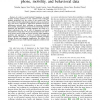Free Online Productivity Tools
i2Speak
i2Symbol
i2OCR
iTex2Img
iWeb2Print
iWeb2Shot
i2Type
iPdf2Split
iPdf2Merge
i2Bopomofo
i2Arabic
i2Style
i2Image
i2PDF
iLatex2Rtf
Sci2ools
ACII
2015
Springer
2015
Springer
Predicting students' happiness from physiology, phone, mobility, and behavioral data
—In order to model students’ happiness, we apply machine learning methods to data collected from undergrad students monitored over the course of one month each. The data collected include physiological signals, location, smartphone logs, and survey responses to behavioral questions. Each day, participants reported their wellbeing on measures including stress, health, and happiness. Because of the relationship between happiness and depression, modeling happiness may help us to detect individuals who are at risk of depression and guide interventions to help them. We are also interested in how behavioral factors (such as sleep and social activity) affect happiness positively and negatively. A variety of machine learning and feature selection techniques are compared, including Gaussian Mixture Models and ensemble classification. We achieve 70% classification accuracy of self-reported happiness on held-out test data.
| Added | 13 Apr 2016 |
| Updated | 13 Apr 2016 |
| Type | Journal |
| Year | 2015 |
| Where | ACII |
Comments (0)

